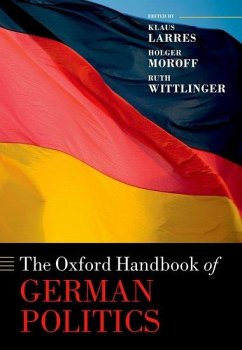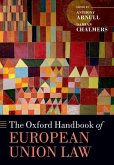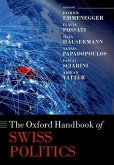The Oxford Handbook of German Politics
Herausgeber: Larres, Klaus; Wittlinger, Ruth; Moroff, Holger
The Oxford Handbook of German Politics
Herausgeber: Larres, Klaus; Wittlinger, Ruth; Moroff, Holger
- Gebundenes Buch
- Merkliste
- Auf die Merkliste
- Bewerten Bewerten
- Teilen
- Produkt teilen
- Produkterinnerung
- Produkterinnerung
Few countries have caused or experienced more calamities in the 20th century than Germany. This handbook provides a comprehensive overview of some of the major issues of German domestic politics, economics, foreign policy, and culture by leading experts in their respective fields.
Andere Kunden interessierten sich auch für
![The Oxford Handbook of Kenyan Politics The Oxford Handbook of Kenyan Politics]() The Oxford Handbook of Kenyan Politics63,99 €
The Oxford Handbook of Kenyan Politics63,99 €![The Oxford Handbook of European Union Law The Oxford Handbook of European Union Law]() The Oxford Handbook of European Union Law68,99 €
The Oxford Handbook of European Union Law68,99 €![The Oxford Handbook of Political Science The Oxford Handbook of Political Science]() The Oxford Handbook of Political Science79,99 €
The Oxford Handbook of Political Science79,99 €![The Oxford Handbook of Swiss Politics The Oxford Handbook of Swiss Politics]() The Oxford Handbook of Swiss Politics202,99 €
The Oxford Handbook of Swiss Politics202,99 €![Dangerous Instrument Dangerous Instrument]() Michael A. Robinson (Non-resident fellow and former Assistant ProfeDangerous Instrument41,99 €
Michael A. Robinson (Non-resident fellow and former Assistant ProfeDangerous Instrument41,99 €![The Oxford Handbook of the Welfare State The Oxford Handbook of the Welfare State]() The Oxford Handbook of the Welfare State50,99 €
The Oxford Handbook of the Welfare State50,99 €![The Oxford Handbook of Terrorism The Oxford Handbook of Terrorism]() The Oxford Handbook of Terrorism230,99 €
The Oxford Handbook of Terrorism230,99 €-
-
-
Few countries have caused or experienced more calamities in the 20th century than Germany. This handbook provides a comprehensive overview of some of the major issues of German domestic politics, economics, foreign policy, and culture by leading experts in their respective fields.
Hinweis: Dieser Artikel kann nur an eine deutsche Lieferadresse ausgeliefert werden.
Hinweis: Dieser Artikel kann nur an eine deutsche Lieferadresse ausgeliefert werden.
Produktdetails
- Produktdetails
- Oxford Handbooks
- Verlag: Oxford University Press
- Seitenzahl: 720
- Erscheinungstermin: 19. Oktober 2022
- Englisch
- Abmessung: 254mm x 180mm x 48mm
- Gewicht: 1452g
- ISBN-13: 9780198817307
- ISBN-10: 0198817304
- Artikelnr.: 66135089
- Herstellerkennzeichnung
- Libri GmbH
- Europaallee 1
- 36244 Bad Hersfeld
- gpsr@libri.de
- Oxford Handbooks
- Verlag: Oxford University Press
- Seitenzahl: 720
- Erscheinungstermin: 19. Oktober 2022
- Englisch
- Abmessung: 254mm x 180mm x 48mm
- Gewicht: 1452g
- ISBN-13: 9780198817307
- ISBN-10: 0198817304
- Artikelnr.: 66135089
- Herstellerkennzeichnung
- Libri GmbH
- Europaallee 1
- 36244 Bad Hersfeld
- gpsr@libri.de
Klaus Larres is the Richard M Krasno Distinguished Professor of History and International Affairs at the University of North Carolina at Chapel Hill. Previously he held professorships at Johns Hopkins University/SAIS, Yale, London University and Queen's University Belfast in the UK, and served as Counselor and Senior Foreign Policy Adviser at the German embassy in Beijing, China. Holger Moroff is visiting professor of strategic studies at the National Defense University and an adjunct professor of political science at the University of North Carolina at Chapel Hill. Previously he also taught international and comparative politics at Friedrich Schiller University Jena and at Leibniz University Hannover. His research focuses on security theories, comparative political corruption, and the internationalization of anti-corruption regimes. Ruth Wittlinger (1961-2020) was a Professor in the School of Government and International Affairs at Durham University, UK, and the Lady Davis Visiting Professor at the Hebrew University of Jerusalem. She published extensively on memory and identity in post-unification Germany and Europe.
* Introduction
* PART I: LEADING SCHOLARS AND THEIR INTERPRETATIONS OF GERMAN HISTORY
FROM WORLD WAR II TO THE PRESENT
* 1: Konrad H. Jarausch: Encounters with Modernity: The German Search
for Alternatives in the Twentieth Century
* 2: Heinrich August Winkler: From Post-National Democracy to
Post-Classical Nation-State
* 3: Ute Frevert: Emotional Styles in Postwar German Politics
* 4: Klaus von Beyme: The Development of Germany after 1945
* PART II: GERMANY DURING THE COLD WAR ERA
* 5: Klaus Larres: Atlantic Integration and "Ever Closer Union": West
Germany, the U.S., and European Unity during the Cold War
* 6: Peter Ruggenthaler: Germany and the Soviet Union during the Cold
War Era
* 7: Gert-Joachim Glaeßner: The Governmental System and Political
History of the GDR
* 8: Larissa R. Stiglich: The End of the Cold War and the Process of
German Unification
* PART III: GERMANY SINCE 1990
* Political Institutions and Constitutional Design
* 9: Ray Hebestreit and Karl-Rudolf Korte: The Executive: The German
Government and Civil Service
* 10: Suzanne S. Schüttemeyer and Sven T. Siefken: The German
Bundestag: The Core Institution in a Parliamentary Democracy
* 11: Arthur Benz: The Federal System and the Länder
* 12: Russell A. Miller: The German Legal System and Courts
* 13: David F. Patton: The 'Old Five': The Bonn Parties in the Berlin
Republic
* 14: Hartwig Pautz: Germany's Political Parties: The Newcomers
* Political Economy and Policy Making
* 15: Christian Schweiger: The German Economic Model: from Germany's
Social Market Economy to Neoliberalism?
* 16: Andreas Busch: Germany's Trading System and Export Driven Economy
* 17: Janine Jacob: Germany's Banking and Financial System
* 18: Peter Starke: The German Welfare State
* 19: Dietrich Thränhardt: The Immigration System and the Rule of Law
* 20: Carl Lankowski: The Merkel Era: Environmental Politics and the '
Energiewende' (energy transition)
* Culture and Society
* 21: Reinhold Sackmann: Demographics and Generational Transition and
Politics
* 22: Detlef Pollack and Olaf Müller: Religion and the Churches
* 23: Joseph Cronin: Jewish Life and Politics in Postwar Germany
* 24: Priscilla Layne: Identity and Diversity in Post-Unification
Germany
* 25: Michael Braun: German Literature, Theatre and Film since 1990
* 26: Marion Deshmukh: German Art After 1990
* PART IV: GERMANY IN GLOBAL AFFAIRS
* 27: Holger Moroff: German Foreign Policy: Roots, Reasonings, and
Repercussions
* 28: Carine Germond: Franco-German Relations and the European
Integration Process since 1990
* 29: Sebastian Harnisch: Germany and EU Foreign Policy
* 30: Patricia Daehnhardt: Germany in the EU: An Assertive Status Quo
Power?
* Germany and the World Beyond Europe
* 31: James Sperling: German Multilateralism after the Cold War
* 32: Markus Kaim: Germany and NATO
* 33: Klaus Schwabe: German-American Relations from 1945 to the Present
* 34: Stephen F. Szabo: Three Chancellors and Russia: German-Russian
Relations since 1990
* 35: Volker Stanzel: A Quarter Century of German Relations with the
Indo-Pacific
* PART V: LOOKING BACKWARD AND FORWARD
* 36: Stefan Kornelius: Angela Merkel in Power: How Influential was the
Merkel Era?
* 37: Jackson Janes: Leaders in Partnership: Germany in the Biden Era
* PART I: LEADING SCHOLARS AND THEIR INTERPRETATIONS OF GERMAN HISTORY
FROM WORLD WAR II TO THE PRESENT
* 1: Konrad H. Jarausch: Encounters with Modernity: The German Search
for Alternatives in the Twentieth Century
* 2: Heinrich August Winkler: From Post-National Democracy to
Post-Classical Nation-State
* 3: Ute Frevert: Emotional Styles in Postwar German Politics
* 4: Klaus von Beyme: The Development of Germany after 1945
* PART II: GERMANY DURING THE COLD WAR ERA
* 5: Klaus Larres: Atlantic Integration and "Ever Closer Union": West
Germany, the U.S., and European Unity during the Cold War
* 6: Peter Ruggenthaler: Germany and the Soviet Union during the Cold
War Era
* 7: Gert-Joachim Glaeßner: The Governmental System and Political
History of the GDR
* 8: Larissa R. Stiglich: The End of the Cold War and the Process of
German Unification
* PART III: GERMANY SINCE 1990
* Political Institutions and Constitutional Design
* 9: Ray Hebestreit and Karl-Rudolf Korte: The Executive: The German
Government and Civil Service
* 10: Suzanne S. Schüttemeyer and Sven T. Siefken: The German
Bundestag: The Core Institution in a Parliamentary Democracy
* 11: Arthur Benz: The Federal System and the Länder
* 12: Russell A. Miller: The German Legal System and Courts
* 13: David F. Patton: The 'Old Five': The Bonn Parties in the Berlin
Republic
* 14: Hartwig Pautz: Germany's Political Parties: The Newcomers
* Political Economy and Policy Making
* 15: Christian Schweiger: The German Economic Model: from Germany's
Social Market Economy to Neoliberalism?
* 16: Andreas Busch: Germany's Trading System and Export Driven Economy
* 17: Janine Jacob: Germany's Banking and Financial System
* 18: Peter Starke: The German Welfare State
* 19: Dietrich Thränhardt: The Immigration System and the Rule of Law
* 20: Carl Lankowski: The Merkel Era: Environmental Politics and the '
Energiewende' (energy transition)
* Culture and Society
* 21: Reinhold Sackmann: Demographics and Generational Transition and
Politics
* 22: Detlef Pollack and Olaf Müller: Religion and the Churches
* 23: Joseph Cronin: Jewish Life and Politics in Postwar Germany
* 24: Priscilla Layne: Identity and Diversity in Post-Unification
Germany
* 25: Michael Braun: German Literature, Theatre and Film since 1990
* 26: Marion Deshmukh: German Art After 1990
* PART IV: GERMANY IN GLOBAL AFFAIRS
* 27: Holger Moroff: German Foreign Policy: Roots, Reasonings, and
Repercussions
* 28: Carine Germond: Franco-German Relations and the European
Integration Process since 1990
* 29: Sebastian Harnisch: Germany and EU Foreign Policy
* 30: Patricia Daehnhardt: Germany in the EU: An Assertive Status Quo
Power?
* Germany and the World Beyond Europe
* 31: James Sperling: German Multilateralism after the Cold War
* 32: Markus Kaim: Germany and NATO
* 33: Klaus Schwabe: German-American Relations from 1945 to the Present
* 34: Stephen F. Szabo: Three Chancellors and Russia: German-Russian
Relations since 1990
* 35: Volker Stanzel: A Quarter Century of German Relations with the
Indo-Pacific
* PART V: LOOKING BACKWARD AND FORWARD
* 36: Stefan Kornelius: Angela Merkel in Power: How Influential was the
Merkel Era?
* 37: Jackson Janes: Leaders in Partnership: Germany in the Biden Era
* Introduction
* PART I: LEADING SCHOLARS AND THEIR INTERPRETATIONS OF GERMAN HISTORY
FROM WORLD WAR II TO THE PRESENT
* 1: Konrad H. Jarausch: Encounters with Modernity: The German Search
for Alternatives in the Twentieth Century
* 2: Heinrich August Winkler: From Post-National Democracy to
Post-Classical Nation-State
* 3: Ute Frevert: Emotional Styles in Postwar German Politics
* 4: Klaus von Beyme: The Development of Germany after 1945
* PART II: GERMANY DURING THE COLD WAR ERA
* 5: Klaus Larres: Atlantic Integration and "Ever Closer Union": West
Germany, the U.S., and European Unity during the Cold War
* 6: Peter Ruggenthaler: Germany and the Soviet Union during the Cold
War Era
* 7: Gert-Joachim Glaeßner: The Governmental System and Political
History of the GDR
* 8: Larissa R. Stiglich: The End of the Cold War and the Process of
German Unification
* PART III: GERMANY SINCE 1990
* Political Institutions and Constitutional Design
* 9: Ray Hebestreit and Karl-Rudolf Korte: The Executive: The German
Government and Civil Service
* 10: Suzanne S. Schüttemeyer and Sven T. Siefken: The German
Bundestag: The Core Institution in a Parliamentary Democracy
* 11: Arthur Benz: The Federal System and the Länder
* 12: Russell A. Miller: The German Legal System and Courts
* 13: David F. Patton: The 'Old Five': The Bonn Parties in the Berlin
Republic
* 14: Hartwig Pautz: Germany's Political Parties: The Newcomers
* Political Economy and Policy Making
* 15: Christian Schweiger: The German Economic Model: from Germany's
Social Market Economy to Neoliberalism?
* 16: Andreas Busch: Germany's Trading System and Export Driven Economy
* 17: Janine Jacob: Germany's Banking and Financial System
* 18: Peter Starke: The German Welfare State
* 19: Dietrich Thränhardt: The Immigration System and the Rule of Law
* 20: Carl Lankowski: The Merkel Era: Environmental Politics and the '
Energiewende' (energy transition)
* Culture and Society
* 21: Reinhold Sackmann: Demographics and Generational Transition and
Politics
* 22: Detlef Pollack and Olaf Müller: Religion and the Churches
* 23: Joseph Cronin: Jewish Life and Politics in Postwar Germany
* 24: Priscilla Layne: Identity and Diversity in Post-Unification
Germany
* 25: Michael Braun: German Literature, Theatre and Film since 1990
* 26: Marion Deshmukh: German Art After 1990
* PART IV: GERMANY IN GLOBAL AFFAIRS
* 27: Holger Moroff: German Foreign Policy: Roots, Reasonings, and
Repercussions
* 28: Carine Germond: Franco-German Relations and the European
Integration Process since 1990
* 29: Sebastian Harnisch: Germany and EU Foreign Policy
* 30: Patricia Daehnhardt: Germany in the EU: An Assertive Status Quo
Power?
* Germany and the World Beyond Europe
* 31: James Sperling: German Multilateralism after the Cold War
* 32: Markus Kaim: Germany and NATO
* 33: Klaus Schwabe: German-American Relations from 1945 to the Present
* 34: Stephen F. Szabo: Three Chancellors and Russia: German-Russian
Relations since 1990
* 35: Volker Stanzel: A Quarter Century of German Relations with the
Indo-Pacific
* PART V: LOOKING BACKWARD AND FORWARD
* 36: Stefan Kornelius: Angela Merkel in Power: How Influential was the
Merkel Era?
* 37: Jackson Janes: Leaders in Partnership: Germany in the Biden Era
* PART I: LEADING SCHOLARS AND THEIR INTERPRETATIONS OF GERMAN HISTORY
FROM WORLD WAR II TO THE PRESENT
* 1: Konrad H. Jarausch: Encounters with Modernity: The German Search
for Alternatives in the Twentieth Century
* 2: Heinrich August Winkler: From Post-National Democracy to
Post-Classical Nation-State
* 3: Ute Frevert: Emotional Styles in Postwar German Politics
* 4: Klaus von Beyme: The Development of Germany after 1945
* PART II: GERMANY DURING THE COLD WAR ERA
* 5: Klaus Larres: Atlantic Integration and "Ever Closer Union": West
Germany, the U.S., and European Unity during the Cold War
* 6: Peter Ruggenthaler: Germany and the Soviet Union during the Cold
War Era
* 7: Gert-Joachim Glaeßner: The Governmental System and Political
History of the GDR
* 8: Larissa R. Stiglich: The End of the Cold War and the Process of
German Unification
* PART III: GERMANY SINCE 1990
* Political Institutions and Constitutional Design
* 9: Ray Hebestreit and Karl-Rudolf Korte: The Executive: The German
Government and Civil Service
* 10: Suzanne S. Schüttemeyer and Sven T. Siefken: The German
Bundestag: The Core Institution in a Parliamentary Democracy
* 11: Arthur Benz: The Federal System and the Länder
* 12: Russell A. Miller: The German Legal System and Courts
* 13: David F. Patton: The 'Old Five': The Bonn Parties in the Berlin
Republic
* 14: Hartwig Pautz: Germany's Political Parties: The Newcomers
* Political Economy and Policy Making
* 15: Christian Schweiger: The German Economic Model: from Germany's
Social Market Economy to Neoliberalism?
* 16: Andreas Busch: Germany's Trading System and Export Driven Economy
* 17: Janine Jacob: Germany's Banking and Financial System
* 18: Peter Starke: The German Welfare State
* 19: Dietrich Thränhardt: The Immigration System and the Rule of Law
* 20: Carl Lankowski: The Merkel Era: Environmental Politics and the '
Energiewende' (energy transition)
* Culture and Society
* 21: Reinhold Sackmann: Demographics and Generational Transition and
Politics
* 22: Detlef Pollack and Olaf Müller: Religion and the Churches
* 23: Joseph Cronin: Jewish Life and Politics in Postwar Germany
* 24: Priscilla Layne: Identity and Diversity in Post-Unification
Germany
* 25: Michael Braun: German Literature, Theatre and Film since 1990
* 26: Marion Deshmukh: German Art After 1990
* PART IV: GERMANY IN GLOBAL AFFAIRS
* 27: Holger Moroff: German Foreign Policy: Roots, Reasonings, and
Repercussions
* 28: Carine Germond: Franco-German Relations and the European
Integration Process since 1990
* 29: Sebastian Harnisch: Germany and EU Foreign Policy
* 30: Patricia Daehnhardt: Germany in the EU: An Assertive Status Quo
Power?
* Germany and the World Beyond Europe
* 31: James Sperling: German Multilateralism after the Cold War
* 32: Markus Kaim: Germany and NATO
* 33: Klaus Schwabe: German-American Relations from 1945 to the Present
* 34: Stephen F. Szabo: Three Chancellors and Russia: German-Russian
Relations since 1990
* 35: Volker Stanzel: A Quarter Century of German Relations with the
Indo-Pacific
* PART V: LOOKING BACKWARD AND FORWARD
* 36: Stefan Kornelius: Angela Merkel in Power: How Influential was the
Merkel Era?
* 37: Jackson Janes: Leaders in Partnership: Germany in the Biden Era








